
Meet the Feebles is a 1989 New Zealand puppet musical black comedy film directed by Peter Jackson, and written by Jackson, Fran Walsh, Stephen Sinclair and Danny Mulheron. It features Jim Henson-esque puppets in a perverse comic satire. Like Henson's Muppets, the Feebles are animal-figured puppets who are members of a stage troupe. However, whereas the Muppets characterize positivity, naïve folly, and innocence, the Feebles largely present negativity, vice, and other misanthropic characteristics. It is the first Jackson film that was co-written by his future partner Fran Walsh, who has gone on to act as co-writer for all his subsequent films.
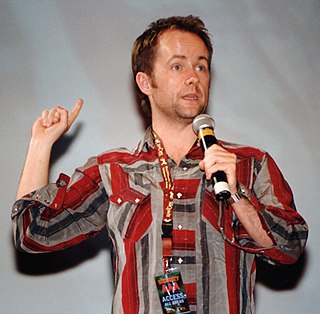
William Nathan Boyd, professionally known as Billy Boyd, is a Scottish actor and musician. He played Peregrin "Pippin" Took in Peter Jackson's epic film trilogy The Lord of the Rings (2001–2003), Barret Bonden in Master and Commander: The Far Side of the World (2003) and Glen and Glenda in the Child's Play film Seed of Chucky (2004) and second season of the television series Chucky (2022).

The Lord of the Rings: The Fellowship of the Ring is a 2001 epic fantasy adventure film directed by Peter Jackson from a screenplay by Fran Walsh, Philippa Boyens, and Jackson, based on 1954's The Fellowship of the Ring, the first volume of the novel The Lord of the Rings by J. R. R. Tolkien. The film is the first instalment in The Lord of the Rings trilogy. It features an ensemble cast including Elijah Wood, Ian McKellen, Liv Tyler, Viggo Mortensen, Sean Astin, Cate Blanchett, John Rhys-Davies, Billy Boyd, Dominic Monaghan, Orlando Bloom, Christopher Lee, Hugo Weaving, Sean Bean, Ian Holm, and Andy Serkis.

The Lord of the Rings: The Two Towers is a 2002 epic fantasy adventure film directed by Peter Jackson from a screenplay by Fran Walsh, Philippa Boyens, Stephen Sinclair, and Jackson, based on 1954's The Two Towers, the second volume of the novel The Lord of the Rings by J. R. R. Tolkien. The sequel to 2001's The Lord of the Rings: The Fellowship of the Ring, the film is the second instalment in The Lord of the Rings trilogy. It features an ensemble cast including Elijah Wood, Ian McKellen, Liv Tyler, Viggo Mortensen, Sean Astin, Cate Blanchett, John Rhys-Davies, Bernard Hill, Christopher Lee, Billy Boyd, Dominic Monaghan, Orlando Bloom, Hugo Weaving, Miranda Otto, David Wenham, Brad Dourif, Karl Urban, and Andy Serkis.

The Lord of the Rings: The Return of the King is a 2003 epic fantasy adventure film directed by Peter Jackson from a screenplay by Fran Walsh, Philippa Boyens, and Jackson. It is based on 1955's The Return of the King, the third volume of the novel The Lord of the Rings by J. R. R. Tolkien. The sequel to 2002's The Lord of the Rings: The Two Towers, the film is the final instalment in The Lord of the Rings trilogy. It features an ensemble cast including Elijah Wood, Ian McKellen, Liv Tyler, Viggo Mortensen, Sean Astin, Cate Blanchett, John Rhys-Davies, Bernard Hill, Billy Boyd, Dominic Monaghan, Orlando Bloom, Hugo Weaving, Miranda Otto, David Wenham, Karl Urban, John Noble, Andy Serkis, Ian Holm, and Sean Bean. Continuing the plot of the previous film, Frodo, Sam and Gollum are making their final way toward Mount Doom to destroy the One Ring, unaware of Gollum's true intentions, while Merry, Pippin, Gandalf, Aragorn, Legolas, Gimli and the others join forces together against Sauron and his legions in Minas Tirith.
The Lord of the Rings is a series of three epic fantasy adventure films directed by Peter Jackson, based on the novel The Lord of the Rings by British author J. R. R. Tolkien. The films are subtitled The Fellowship of the Ring (2001), The Two Towers (2002), and The Return of the King (2003). Produced and distributed by New Line Cinema with the co-production of WingNut Films. The films feature an ensemble cast including Elijah Wood, Ian McKellen, Liv Tyler, Viggo Mortensen, Sean Astin, Cate Blanchett, John Rhys-Davies, Christopher Lee, Billy Boyd, Dominic Monaghan, Orlando Bloom, Hugo Weaving, Andy Serkis and Sean Bean.

The Hobbit is a 1977 American animated musical television special created by Rankin/Bass and animated by Topcraft. The film is an adaptation of the 1937 book of the same name by J. R. R. Tolkien; it was first broadcast on NBC in the United States on Sunday, November 27, 1977. The teleplay won a Peabody Award. The Tolkien scholar Douglas A. Anderson called the adaptation "execrable".

Winnetou is a fictional Native American hero of several novels written in German by Karl May (1842–1912), one of the best-selling German writers of all time with about 200 million copies worldwide, including the Winnetou trilogy. The character made his debut in the novel Old Firehand (1875).

Changes in Star Wars re-releases vary from minor differences in color timing, audio mixing, and take choices to major insertions of new visual effects, additions of characters and dialogue, scene expansions, and replacement of original cast members with newer ones. Though changes were also made to the prequel trilogy, the original trilogy saw the most alteration. Dissatisfied with the original theatrical cuts of the original Star Wars film, The Empire Strikes Back, and Return of the Jedi, creator George Lucas altered the films in ways that were ostensibly not initially possible, primarily due to limitations of time, budget, and technology.
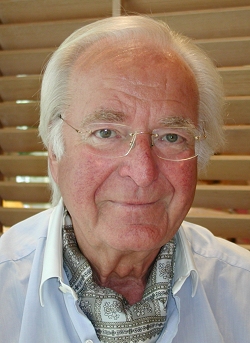
Martin Böttcher was a German composer, arranger and conductor.

Pierre-Louis Le Bris, known as Pierre Brice, was a French actor, best known as portraying fictional Apache-chief Winnetou in German films based on Karl May novels.
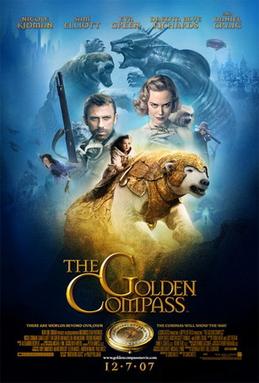
The Golden Compass is a 2007 fantasy adventure film written and directed by Chris Weitz that is based on the 1995 novel Northern Lights by Philip Pullman, the first installment in Pullman's His Dark Materials trilogy, which was published as The Golden Compass in the United States. It stars Dakota Blue Richards as Lyra Belacqua, Nicole Kidman as Marisa Coulter, and Daniel Craig as Lord Asriel, alongside Sam Elliott, Ian McKellen, and Eva Green. In the film, Lyra joins a tribe of seafarers on a trip to the far North in search of children kidnapped by the Gobblers, a group supported by the universe's rulers, the Magisterium.

Der Schuh des Manitu is a 2001 German Western parody film. Directed by Michael Herbig, it is a film adaptation of the Winnetou sketches from his ProSieben television show Bullyparade. With earnings of about 65 million Euro and 11.7 million visitors in cinemas, it is one of the most successful German movies after the Second World War.

Bullyparade is a German late night comedy sketch show which aired from 1997 to 2002 on German channel ProSieben. Michael Herbig, Rick Kavanian and Christian Tramitz were the main cast of the show. Herbig also directed, produced and mainly developed the show, while all three comedians wrote the sketches and characters.
Viktor Giacobbo is a Swiss writer, comedian and actor.
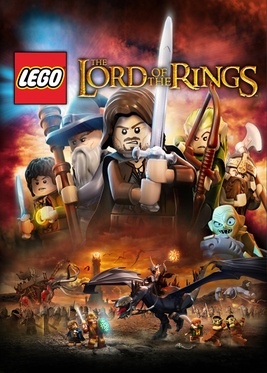
Lego The Lord of the Rings is a Lego-themed action-adventure video game developed by Traveller's Tales, that was released on Nintendo 3DS, Nintendo DS, PlayStation Vita, Microsoft Windows, Wii, PlayStation 3, and Xbox 360. The OS X version of the game, published by Feral Interactive, was released on 21 February 2013.
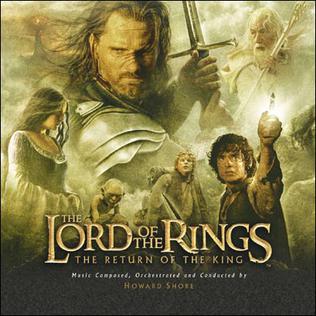
The Lord of the Rings: The Return of the King is the soundtrack for the 2003 epic fantasy adventure film of the same name. The score was composed, orchestrated, and conducted by Howard Shore, and performed by the London Philharmonic Orchestra, the London Voices, and the London Oratory School Schola. The soundtrack was released on 25 November 2003. The limited edition contains a bonus DVD with the track "Use Well the Days" by Annie Lennox, song texts, photo gallery, and a Lord of the Rings trilogy supertrailer.

The Treasure of the Silver Lake is a 1962 Western film directed by Harald Reinl, loosely based on German author Karl May's 1891 novel of the same name. It was the first in a highly-successful series of films based on May's works by the West German studios Rialto and Constantin Film, starring American actor Lex Barker as the frontiersman Old Shatterhand and French actor Pierre Brice as the Apache warrior Winnetou.
Commentators have compared Peter Jackson's 2001–2003 The Lord of the Rings film trilogy with the book on which it was based, J. R. R. Tolkien's 1954–1955 The Lord of the Rings, remarking that while both have been extremely successful commercially, the film version does not necessarily capture the intended meaning of the book. They have admired Jackson's ability to film the long and complex work at all; the beauty of the cinematography, sets, and costumes; the quality of the music; and the epic scale of his version of Tolkien's story. They have however found the characters and the story greatly weakened by Jackson's emphasis on action and violence at the expense of psychological depth; the loss of Tolkien's emphasis on free will and individual responsibility; and the replacement of Frodo's inner journey by an American monomyth with Aragorn as the hero.
The music of The Lord of the Rings film series, composed by Howard Shore to accompany Peter Jackson's films, exists in multiple recordings. It was heard by cinema audiences in the "theatrical" version, also released on DVD. Three single-disc albums were then released, forming briefer concert-pieces that broadly aligned with the narrative content of each film. Limited Deluxe CD versions contained additional bonus tracks. Extended versions of the films were released on DVD, with additional scenes and their accompanying music. A multi-disc set, The Complete Recordings, covered the entire score of the extended versions of the films on CD. A CD, The Rarities Archives, accompanied a 2010 book by Doug Adams. Finally, Shore edited The Lord of the Rings Symphony in six movements from the score, for concert performance.





















